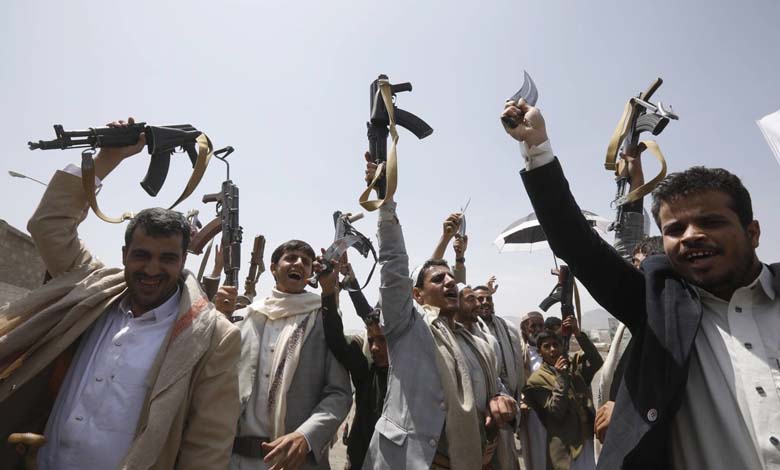Anniversary of Unity… Houthi and Brotherhood Terrorism Tears Yemen Apart

Caught between Houthi separatism and Brotherhood opportunism, Yemeni unity finds itself trapped between the clutches of terrorist organizations aiming to tear the country apart.
As the 34th anniversary of the unification of North and South Yemen is celebrated today, May 22, Houthi militias and the Muslim Brotherhood continue to wave the slogan “unity or death” to justify their crimes and attempt to invade the South once more.
They do so without considering the realities produced by the war of the coup, while both groups practically work to split the country both materially and morally with a despotic tendency. The latest example is the militias preventing the celebration of May 22 under the pretext of sharing Iran’s grief.
In contrast, Southerners, who led the unity project before their dream was overturned by the invasion of their lands in the summer of 1994, now choose secession to defend their cause on all levels, counter destructive projects, and preserve the significant achievement of liberating the South from Houthi militias and terrorist organizations like Al-Qaeda, ISIS, and even the Brotherhood.
Between the 34th anniversary of unity and the 30th anniversary of the declaration of secession, others, standing in the middle, see the division of Yemenis as an opportunity for the active forces in the South and North to maintain the consensus formed by the Presidential Council, support the Southern cause, and direct the battle towards liberating Sanaa from Houthi expansion.
Emptying Unity of Its Substance
On the eve of the 34th anniversary of the country’s unification, the President of the Presidential Leadership Council, Rashad al-Alimi, strongly rejected “emptying unity of its national, political, and moral substance, and turning it into a misleading slogan hiding a tendency for authoritarianism and monopolizing power and wealth.”
In his speech, al-Alimi said that the Houthis’ “pretentious talk about Yemeni unity while systematically working to establish a reality of material and moral division every day, fragmenting the social fabric on class, sectarian, and regional bases.”
He promised to make the “Southern issue a foundation for a comprehensive solution and be open to all options enabling Yemenis to achieve their aspirations and determine their political status, as well as their economic, social, and cultural development according to references.”
He added, “It suffices that we are meeting today in the temporary capital, Aden, as a unified consensus leadership to face renewed risks, as our predecessors did for nearly seven decades defending the republican system, which has never faced more difficult times than it does now, with a hysterical pursuit of our people by a terrorist group, causing hundreds of thousands of deaths and millions of displacements, exceeding all racial wars in their dark history.”
While praising the virtues of the first generation that contributed to the birth of the Yemeni Republic, al-Alimi expressed his appreciation “to those who corrected the course of this national project after the summer war of 1994, beginning with the peaceful Southern movement and ending with the resistance to the Houthis.”
He explained that “the best way to celebrate national holidays is to seriously confront the existing challenges, work on addressing present issues and future requirements, without getting lost in past differences and conflicts, but turning them into an opportunity for review, evaluation, and moving forward towards a better future.”
Al-Alimi revealed that “the Houthis continue to refuse peace in all its forms until now” and confirmed that they “are heading towards a full military adventure to impose their repressive will on the Yemeni people, who have resisted and will resist this authoritarian project forever.”
The Necessity of Sanaa
The ultimate goal of Yemenis, both in the north and the south, is to restore the state and bring Sanaa back to its Arab era, whether through peace or war, while opposing the Houthi coup and terrorist organizations.
This was confirmed by the spokesperson for the National Resistance in Yemen, Brigadier General Sadeq Doweid, who said that September 26 and October 14, marking the Republic and independence, and May 22 are major turning points in Yemen’s contemporary history.
However, according to the military spokesperson, “all these dates are mere titles without Sanaa,” referring to the Houthi militias‘ destruction of the unity project in favor of their sectarian expansionist agenda. He added that “liberating Sanaa from the hands of the obscurantists is a sacred jihad, and that the Houthi militias pose a threat to the entire Yemen, with their racist and sectarian project undermining our society both in the north and the south.”
In turn, the Southern Transitional Council reaffirmed in a statement on the 30th anniversary of the declaration of separation its commitment to restoring the state and building a state of partnership, citizenship, development, security, and stability.
The Transitional Council emphasized the need to “address the unity problem through dialogue, something that the forces of the July 7, 1994 regime continue to evade, thereby legitimizing the resistance of all southern national movements against the occupation in all its forms and at all stages of their struggle.”
It also pledged to “bravely confront all attempts to target the south on the battlefronts against the Houthi terrorist militias, in combating terrorist organizations in the operational theater, and in facing all forms of targeting our cause and national will, politically, economically, militarily, and security-wise, with an unwavering national will that knows only victory.”
-
Houthi-Brotherhood Scheme Against the South… Details?
-
“Deadly Pesticides”… Houthis Launch Repression Campaign to Silence Activists
The Need for Correction
In this context, the expert on terrorist groups in Yemen, Saeed Bakran, emphasized the need for “correction and the creation of a new reality moving towards peace, life, and coexistence.”
Bakran urged the elites in northern Yemen to work courageously to review all the sacred doctrines of unity and to open discussions to draw lessons and insights to prevent the recurrence of the same horrific scenario.












